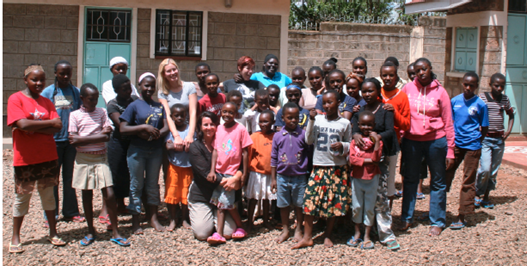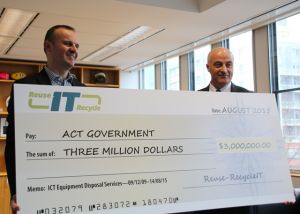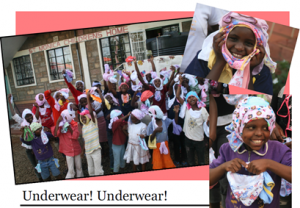 We spoke to James Falzon from Capital Easy Finance & Leasing about how they stumbled on a new service that benefits both their clients and communities in some of the poorest parts of the world.
We spoke to James Falzon from Capital Easy Finance & Leasing about how they stumbled on a new service that benefits both their clients and communities in some of the poorest parts of the world.
Capital Easy Finance & Leasing was started 16 years ago to help organisations develop flexible leasing programs for purchasing IT and business equipment.
As part of this, the company developed a complete end to end process whereby it acquired equipment, financed equipment, and at the end of its life collected, sanitised information from the then user and disposed of it.
"We were approached by a Government CIO to see if we could assist in the disposal of departmental owned replaced IT equipment; given that we had built expertise from disposing of our own leased assets," said James.
"This has grown to be a significant alternative and necessary service we offer that we had never really thought about."

James paints a clear picture of the problem, "When you replace your old computer, it often lands up in the garage or store until you decide what to do with it. That is, how to treat information it may contain etc. Now imagine this is on a much larger scale when it's a Government agency or Department that has just upgraded its technology!"
James believes the ACT Government has done it well, by being at the forefront of "Best Practice – ICT Disposal".
Prior to engaging Capital Easy 5 years ago, the Territory recovered less than $50,000 on the entire disposal of its IT, including school and education equipment. Then Capital Easy came along with a solution that involved the Territory being a 'price maker' rather than 'price taker' through the traditional disposal methods.
"We ensured that surplus or equipment to dispose of was processed. This meant it was cleaned, de-tagged, checked to be in working order, sanitised in accordance with Australian Security Information Management Standards, treated and made ready for reuse. We then took the equipment and marketed it to secondary remarketers on a global scale," said James.
"We leveraged our good name and intellectual property to obtain the best return to the Territory; avoided needless costs with disposing of equipment, and finally as a community we've been rewarded with a great return in the knowledge that no equipment has ended up in landfill and that we have secondary users who may otherwise have struggled to cross the digital divide because they don't have access to technology equipment".
 One program that has benefited from this service indirectly is St. Monica' Orphanage for young women in Kenya.
One program that has benefited from this service indirectly is St. Monica' Orphanage for young women in Kenya.
James says they were able to supply the orphanage with laptops suited to the Kenyan environment where power is so variable that any equipment provided needs its own power supply to cope with those times when power access was limited.
The orphanage has also been supported in a number of ways in addition to the equipment, including raising funds to provide for the community. Using funds to supply underwear for example in a community that regards having more than one pair as a luxury.
James believes that getting the maximum return for obsolete equipment is one thing, but being able to do right by the community is also important.
He stresses that there are many questions that could be asked across Federal Government and other jurisdictions about what returns they have achieved; what they are doing with their old IT equipment, such as, is there a realistic secondary user out there that could benefit?
Also, people don't realise that much of the IT equipment manufactured, are treated with highly carcinogenic chemicals to act as fire retardants and now when it comes time to disposing of them we have the risk that they may end up in landfill and leech into the water tables for generations in the future.

According to James there are many layers of beneficiaries in a process such as the one provided by Reuse-RecyleIT.
"The Government receives a maximum return, the secondary user benefits, and of course as a global community we benefit from controlling the treatment and management of these materials".
There are 4 million computers sold in Australia annually, yet according to ABS statistics only 10% of these are reused or recycled. And while ABS figures state that since 2007 there have been 1.5 million computers that have been reused or recycled, this is nothing when 37 million devices in Australia have been replaced.
For more information, contact James Falzon: 02 6282 7844 or Visit the RRIT website: www.reuse-recycleit.com.au
About Lighthouse Business Innovation Centre
Lighthouse has a strong track record of supporting entrepreneurs, researchers and inventers on the path from concept to commercialisation. Since July 2008, Lighthouse has worked with over 990 distinct enterprises and provided group and peer based services to over 3400 enterprises and individuals. For over five years Lighthouse has successfully delivered business advice, education, mentorship and networking opportunities to help these businesses commercialise their ideas and grow their companies. Lighthouse also delivers programs such as the ACT Microcredit Program for the ACT Government. Visit www.lighthouseinnovation.com.au for more information.


